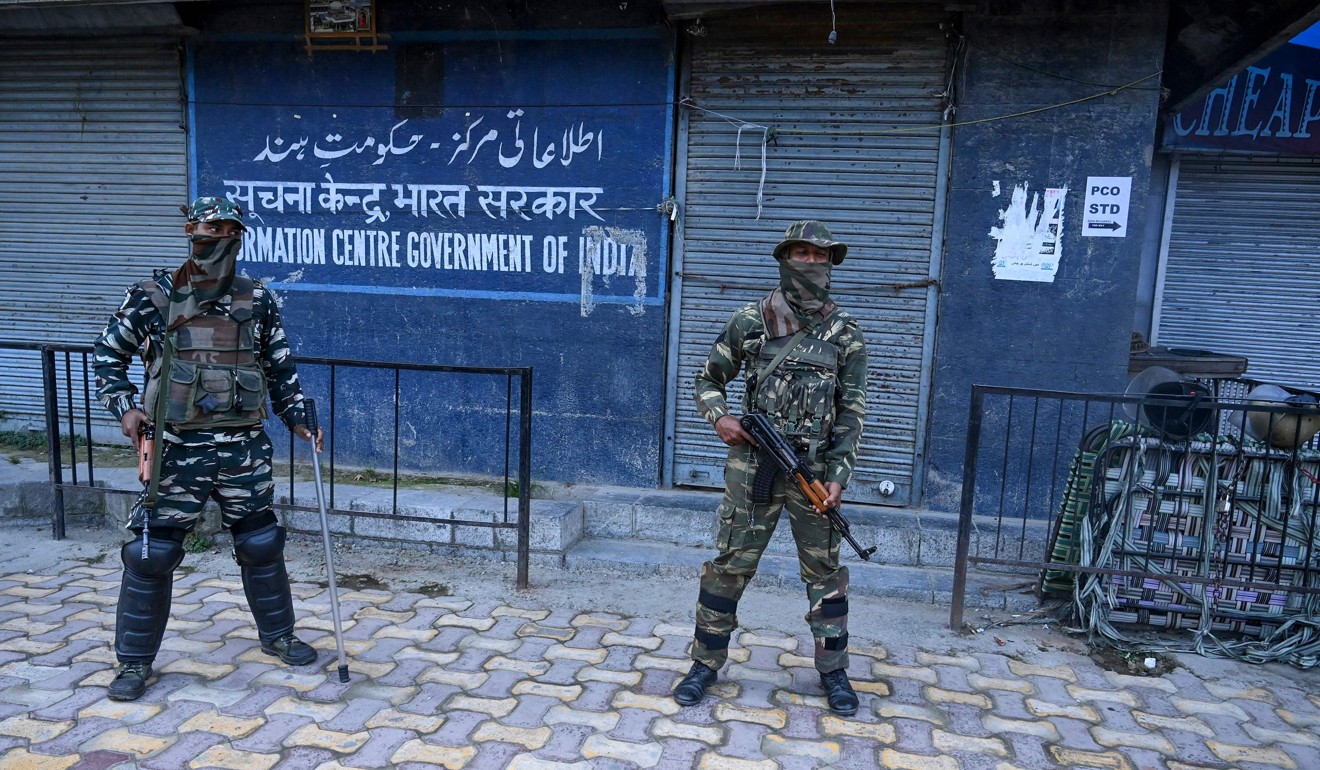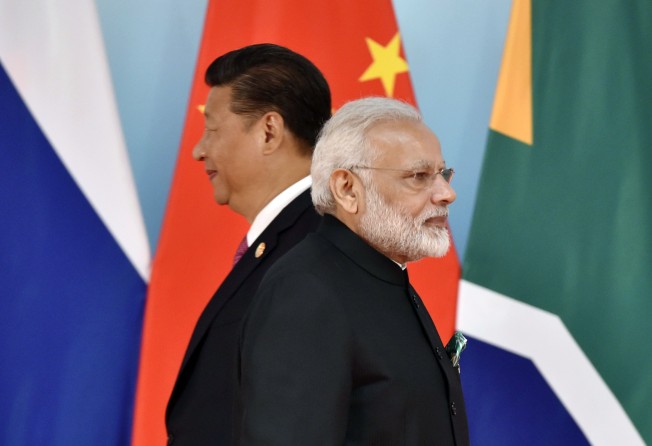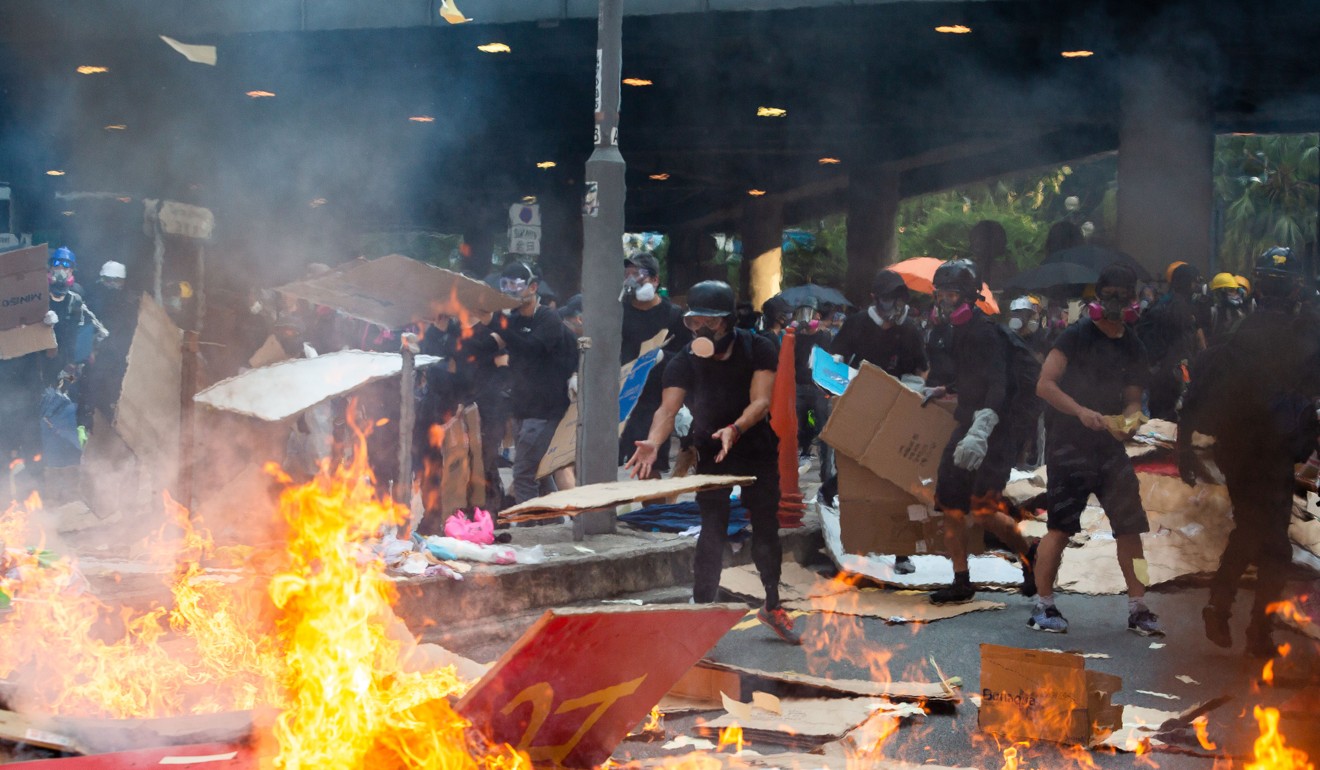
Xi has an eye on Kashmir. Is Modi watching Hong Kong, Xinjiang and the South China Sea?
- In a dig at India’s leader, opposition politician Manish Tewari has asked if Modi will raise the sensitive issues during his informal summit with the Chinese president
- But analysts say it is a political move to pressure Modi’s BJP, and his stance does not reflect the Congress party’s position on Beijing

A senior opposition politician took a dig at Indian Prime Minister Narendra Modi ahead of his informal summit with Chinese President Xi Jinping this weekend, by asking if India’s leader would raise sensitive issues such as the disputed South China Sea and anti-government protests in Hong Kong.
Congress senior leader Manish Tewari’s comments were prompted by reports this week of Xi’s meeting with Imran Khan, the leader of India’s arch-enemy, Pakistan. Tensions between the rivals, who share a border with China, have been high since New Delhi in August stripped Indian-controlled Kashmir of its statehood and imposed a lockdown and communications blackout on the region. Pakistan and India both claim Kashmir in full.
During their meeting, Xi told Khan that Beijing – a key ally of Islamabad – was playing close attention to what was happening in Kashmir. “China supports Pakistan to safeguard its own legitimate rights and hopes that the relevant parties can solve their disputes through peaceful dialogue,” Xi said, according to state news agency Xinhua.

In a television news interview on Wednesday, Tewari said India should “think through its China policy very carefully”.
“If Xi Jinping says ‘We are watching Kashmir’, then what stops PM Narendra Modi … to say that we are watching the pro-democratic movement in Hong Kong?” he said.
In a Twitter follow-up, Tewari asked why the prime minister’s office and ministry and external affairs did not say it was watching “human rights violations in Xinjiang”, “continued oppression in Tibet” and the South China Sea.
Xi Jingping says he is watching Kashmir but why does @PMOIndia/MEA not say 1)We are watching Pro Democracy protests muzzled in Hong Kong. 2 )We are watching human rights violations in Xinjiang. 3 )We are watching continued oppression in Tibet 4 )We are watching South China Sea
— Manish Tewari (@ManishTewari) October 10, 2019
China has been accused by human rights watchers of detaining and abusing Muslim minorities, including Uygurs in Xinjiang, and maintains control over Tibet after its quashing of an uprising 60 years ago, which resulted in the Dalai Lama’s exile.
Beijing is also navigating disputes with Southeast Asian countries over territory in the South China Sea.
In an additional taunt on Twitter, Tewari said Modi should ask Xi about Aksai Chin, a desert expanse that lies between Kashmir and China’s far western region of Xinjiang. The area is controlled by China but claimed by India, and is among the border disputes that have dogged bilateral relations for years.
While Tewari’s remarks were widely reported by Indian media, analysts said they were a political move to pressure Modi’s Bharatiya Janata Party, and that his stance did not reflect the Congress party’s position on China.
When asked for comment, Congress leader M.M. Pallam Raju stressed that the Xi-Modi meeting should focus on bilateral rather than domestic issues.
“Conventionally, talks between the two heads of state deal with bilateral issues such as trade, water disputes or border problems. The [Indian] government should focus on China’s outright support of Pakistan on contentious issues such as [terrorist group leader] Masood Azhar or talks that help to improve both the Indian and Chinese economies,” Raju told This Week in Asia.
Delhi-based foreign affairs analyst Zorawar Daulet Singh said Tewari’s linking of Aksai Chin and Kashmir was a “tenuous proposition”.

“While India’s position on Kashmir has been crystal clear from the outset of Pakistan’s invasion [of the region] in 1947, India’s claim to Aksai Chin was weak even in the 1950s as we know from historical records,” he said.
Delhi has reacted sharply to any perceived criticism of its move to revoke Kashmir’s autonomy. Earlier this month, India’s external affairs ministry spokesperson said Malaysia should “desist from making such remarks” after Prime Minister Mahathir Mohamad in his address to the United Nations general assembly described Kashmir as having been “invaded and occupied” and said India’s actions were “wrong”.
The ministry took the same stance when Chinese foreign minister Wang Yi at the same forum said the Kashmir dispute should be “properly addressed in accordance with the United Nations Charter, Security Council resolutions and bilateral agreement”.
Just before China and India announced the dates for this week’s informal summit in the coastal town of Mamallapuram, near Chennai, Chinese foreign ministry spokesperson Geng Shuang struck a more conciliatory tone when he said Kashmir was a bilateral matter between India and Pakistan, and both sides should resolve it through dialogue.
Xi is scheduled to arrive in India on Friday and conduct talks with Modi on Saturday. The leaders are expected to discuss their long-standing border issues, tourism and trade, including India’s US$53 billion trade deficit with China.
Said Singh, the foreign affairs analyst: “China’s approach has alternated between a highly partisan one in favour of Pakistan and pronouncements that suggest neutrality. Hopefully, Xi and Modi will convince each other of the virtues of non-interference in their countries’ internal affairs.”